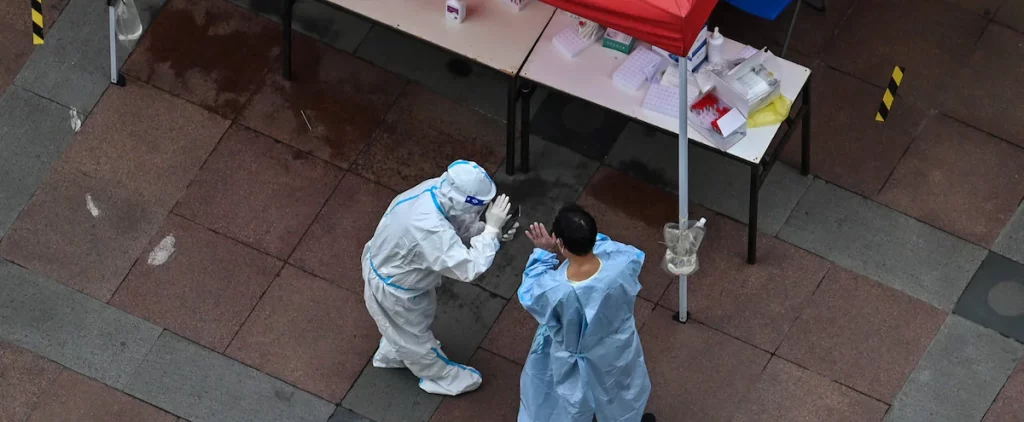
Every day in China, hundreds of millions of disposable swabs are inserted into the throat of officers in complete suite for large-scale PCR testing. Problem: The operation produces large amounts of medical waste.
Also read: Kovid in Beijing: Screening will resume after the bar spreads
Also read: Shanghai will re-detain 2.7 million residents
With the Zero Kovid strategy, the Asian giant is the last major economy that wants to prevent any kind of infection at all costs, in order not to officially flood its hospitals in the face of a low vaccination rate among seniors.
In its anti-coronavirus arsenal: mandatory restraints, localized restraints and therefore heavy screenings, have become almost daily in some places.
From Beijing to Shanghai, through Shenzhen, home to the “Chinese Silicon Valley” of many technology companies, cities are now filled with tiny prefabs or tents that offer free PCR testing.
Hundreds of millions of people need to be tested every three or two days or every other day.
These PCR tests, which create enormous medical waste, place a growing financial burden on local authorities, which already have huge debts, costing tens of billions of euros.
Yifi Li, an environmental expert at New York University in Shanghai, said, “The amount of medical waste generated on a daily basis is almost unprecedented in human history.
“The problems are already big and they are getting worse,” he told AFP.
China, whose environment has been severely damaged by economic growth, has tightened its laws against air and water pollution over the past decade.
The country is aiming for carbon neutrality by 2060, which is an ambitious and highly uncertain goal as the Asian giant currently relies on coal.
The generalization of PCR tests poses a new environmental challenge.
For the few dozen positive cases found every day in China, it is necessary to test hundreds of millions of people and use enormous tubes, cleaners, packaging and combinations.
If not disposed of properly, this medical waste can contaminate soil and waterways.
According to AFP estimates, Chinese cities and provinces with a total population of 600 million have announced their population as a form of routine and routine screening.
68,500 tons of medical waste
National data is not available, but officials in Shanghai said last month that 68,500 tonnes of medical waste was generated during the city’s lockdown in mid – March and early June.
This represents a daily amount six times higher than normal.
According to Chinese regulations, the authorities are responsible for sorting, disinfecting, transporting and storing such waste before disposing of it – usually by incineration.
“However (…) I’m not sure if rural areas can really cope with the significant increase in medical waste,” said Yanjong Huang AFP, a public health specialist at the Council on Foreign Relations. Said with an American think tank.
Benjamin Steer of the Hong Kong University of Science and Technology said some local authorities may not know how to deal with this large amount of waste, or how to store it in landfills.
When questioned by the AFP, the Ministry of Health said it had formulated “specific requirements for medical waste management” in relation to COVID-19.
The government wants regional capitals and cities with a population of at least 10 million to set up testing sites within 15 minutes of each resident walking.
But Nomura Bank analysts last month estimated that expanding regular, mandatory screening across China would cost the country 0.9% to 2.3% of GDP.
For Jin Dong-yan, a professor of biomedical sciences at the University of Hong Kong, these extensive PCR tests are “really inefficient and expensive” and will force local governments to abandon other useful investments in the health sector.
He said the omicron variant spreads rapidly and is difficult to detect so officials risk losing even positive cases.
“It doesn’t work,” he said. “It’s like throwing millions of dollars out the window.”





More Stories
Allegations of corruption Qatar warns of ‘negative impact’ of European measures
USA: Famous “Hollywood cat” euthanized in Los Angeles
The campaigner who called for the shooting of Ukrainian children has not been charged